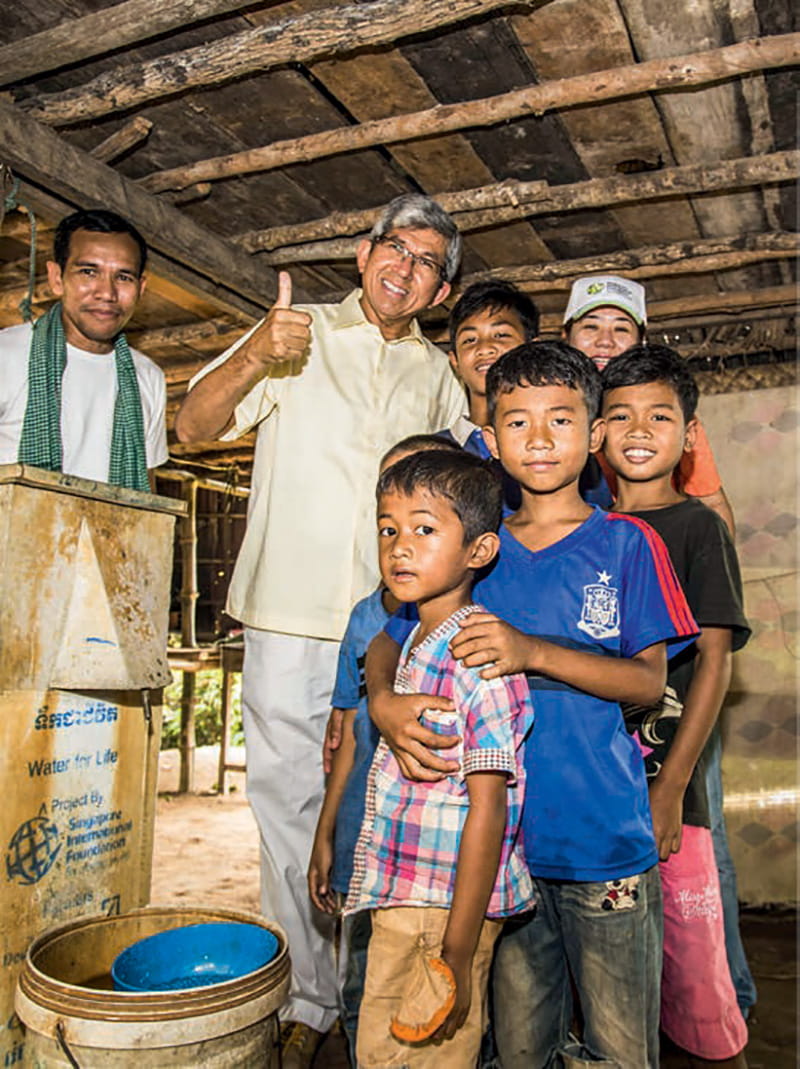Stories > Joining Friendly Hands
Joining Friendly Hands
Direct Service Projects are one of the many ways the Singapore International Foundation connects volunteers with meaningful programmes overseas, helping to bring about positive social change.
BY SASHA GONZALES
PHOTOS SINGAPORE INTERNATIONAL FOUNDATION

In November 2017, Singaporeʼs Minister for Communications and Information, Dr Yaacob Ibrahim, visited a few Cambodian households who have benefited from WFL; he also officiated the launch of WoW Yogyakarta.
he Singapore International Foundation’s (SIF) Direct Service Projects were created to bring about tangible and immediately observable outcomes to overseas communities, present learning opportunities and meaningful service experiences for Singaporean volunteers, and foster friendships between these volunteers and their host communities.
Water For Life (WFL) (Siem Reap) and Words On Wheels (WoW) (Yogyakarta) are two projects that have already yielded beneficial results in the communities they were launched in. They have attracted an impressive number of citizen ambassadors who are keen to dedicate their time, skills and knowledge in order to enrich lives and effect positive change overseas.
WFL has also gotten the attention and support of Singapore’s leaders: In November 2017, Singapore’s Minister for Communications and Information, Dr Yaacob Ibrahim, visited Prasat Bakong in Siem Reap, to witness first-hand the positive impact the project has had on rural households there.
WATER FOR LIFE: SIEM REAP
In 2010, SIF launched WFL, a direct-service clean water programme in the Cambodian city of Siem Reap. The programme utilises various clean water technologies, such as bio-sand water filters, tube wells, and membrane water filters, to address gaps in rural communities’ water ecosystems. One of these is the fact that nearly a quarter of Cambodia’s 15.6 million people do not have access to clean water.
WFL’s main goal is to reduce the incidence of water-borne diseases like diarrhoea, hepatitis A, and typhoid, improve hygiene and sanitation conditions, enhance livelihood opportunities, and improve overall well-being. At the end of 2014, the installation of 2,600 bio-sand filters had benefited 17,000 villagers and led to an 85 per cent drop in the incidence of water-borne diseases among them. By 2017, the filters had also been installed in 12 communes in Kampong Speu, Cambodia, providing safe and accessible drinking water to 44,000 villagers. By the time WFL’s second phase closes in 2021, another 9,000 Cambodian villagers will have access to safe drinking water.
Yeap Soy, 70, and her son were among the several households who received a biosand filter during Dr Yaacob’s recent visit to their village. As she is a widow and her son works all day in the city, it has been difficult for her to have to draw well water on her own and have to boil it before consumption.
And it’s not just the villagers who have benefitted from WFL’s success. Volunteers, too, appreciate the opportunity to establish friendships with the Cambodians and share with them about Singapore. Many have also developed close friendships with their fellow volunteers; Anthony Mok says he is still in touch with his team from his first stint with WFL back in 2013, and that they still meet every three to four months to catch up.
WORDS ON WHEELS: YOGYAKARTA
Based on a similar programme launched in Bandung in 2015, WoW debuted in November 2017 in Yogyakarta. A mobile literary project, it is designed to promote reading and self-learning habits among participating schools and communities.
“Besides [our shared sense of] kinship, I also treasure the friendships [I have] made with the other volunteers and members of the community.”
Betsy Ng Ling Ling, WoW volunteer and team leader
In addition to providing free access to educational materials in English and Bahasa Indonesia, IT resources and learning facilities, staff and volunteers also conduct reading and storytelling sessions, and provide coaching on using the Internet and multimedia tools to enhance the technological skills of the communities.
WoW Yogyakarta operates four times a week, visiting children from low to middle income families from 10 schools in the city on a rotational basis.
It’s expected that the programme will benefit over 5,000 students annually until 2020. As well as more than 150 Singapore International Volunteers, the project has also engaged specialist volunteers from Singapore’s National Library Board, who are conducting a series of workshops on library management for the Board of Library and Archives of the Special Region of Yogyakarta (BPAD DIY). These trainees will then share their new knowledge and skills with their Indonesian peers, to effect sustainable development in enhancing library services with the wider community.
WoW is more than a mobile library that encourages lifelong learning. The project is also “a vehicle of friendship – bringing Indonesians and Singaporeans together to share ideas and cultures through their mutual love for books”, said Dr Yaacob, who attended the project’s launch in November 2017. Betsy Ng Ling Ling can certainly vouch for that. “Volunteering is rewarding because it fosters a community dedicated to improving the lives of people in need,” says the Direct Service Team Leader, who has volunteered in Indonesia and Vietnam. “Besides kinship, I also treasure the friendships made with the other volunteers and members of the community. My most memorable experience was with the Lamongan group in Surabaya at the end of 2013.
The chemistry between the volunteers was awesome, and we got to interact with the locals and play soccer with the kids. Although my time spent with them was short, it gave me a sense of happiness beyond words.”
